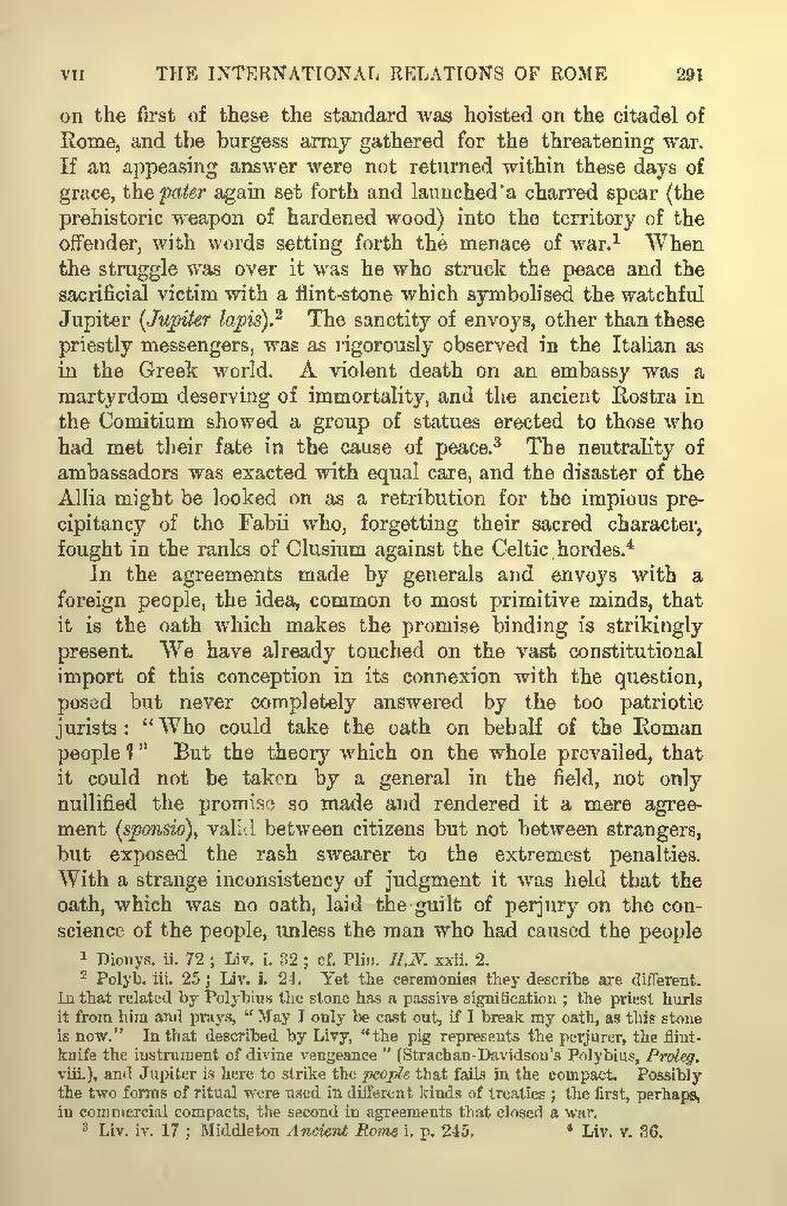on the first of these the standard was hoisted on the citadel of Rome, and the burgess army gathered for the threatening war. If an appeasing answer were not returned within these days of grace, the pater again set forth and launched a charred spear (the prehistoric weapon of hardened wood) into the territory of the offender, with words setting forth the menace of war.[1] When the struggle was over it was he who struck the peace and the sacrificial victim with a flint-stone which symbolised the watchful Jupiter (Jupiter lapis).[2] The sanctity of envoys, other than these priestly messengers, was as rigorously observed in the Italian as in the Greek world. A violent death on an embassy was a martyrdom deserving of immortality, and the ancient Rostra in the Comitium showed a group of statues erected to those who had met their fate in the cause of peace.[3] The neutrality of ambassadors was exacted with equal care, and the disaster of the Allia might be looked on as a retribution for the impious precipitancy of the Fabii who, forgetting their sacred character, fought in the ranks of Clusium against the Celtic hordes.[4]
In the agreements made by generals and envoys with a foreign people, the idea, common to most primitive minds, that it is the oath which makes the promise binding is strikingly present. We have already touched on the vast constitutional import of this conception in its connexion with the question, posed but never completely answered by the too patriotic jurists: "Who could take the oath on behalf of the Roman people?" But the theory which on the whole prevailed, that it could not be taken by a general in the field, not only nullified the promise so made and rendered it a mere agreement (sponsio), valid between citizens but not between strangers, but exposed the rash swearer to the extremest penalties. With a strange inconsistency of judgment it was held that the oath, which was no oath, laid the guilt of perjury on the conscience of the people, unless the man who had caused the people
- ↑ Dionys. ii. 72; Liv. i. 32; cf. Plin. H.N. xxii. 2.
- ↑ Polyb. iii. 25; Liv. i. 24. Yet the ceremonies they describe are different. In that related by Polybius the stone has a passive signification; the priest hurls it from him and prays, "May I only be cast out, if I break my oath, as this stone is now." In that described by Livy, "the pig represents the perjurer, the flint-knife the instrument of divine vengeance" (Strachan-Davidson's Polybius, Proleg. viii.), and Jupiter is here to strike the people that fails in the compact. Possibly the two forms of ritual were used in different kinds of treaties; the first, perhaps, in commercial compacts, the second in agreements that closed a war.
- ↑ Liv. iv. 17; Middleton Ancient Rome i. p. 245.
- ↑ Liv. v. 36.
